TAKE SOMEONE YOU WANT TO EXCITE…
When anyone foolishly questions as to whether erotic films can be genuinely considered “art,” all you need to do is point these cultural heathens to the films of Radley Metzger, ideally while scoffing in their face. His takes on seduction are among the most beautifully-shot, cleverly-written films of the ’60s and ’70s — they just happen to often involve sex. Hell, if I could be assured that heterosexual sex was as good as it looked in a Metzger film, I could be talked into having some.
Both his “softcore” and “hardcore” films have gotten a fair share of notoriety as of late, the latter through Distribpix’s excellent release of THE OPENING OF MISTY BEETHOVEN, and the latter from releases by Cult Epics on the American side of the pond, and now through Arrow Films in the U.K., who’ve recently beautifully restored SCORE, THE LICKERISH QUARTET and CAMILLE 2000 for release on DVD and Blu-ray. We’ll be reviewing the discs individually, and we also had the chance to talk to Mr. Metzger about the themes of his films, his actors and his current plans.
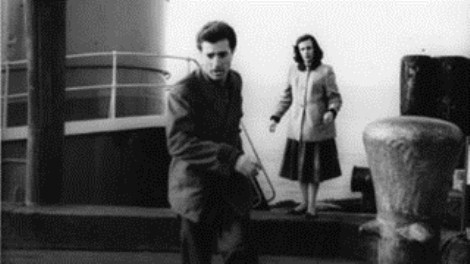
Paul Freitag-Fey (P): After your first film, DARK ODYSSEY, you cut a number of trailers for foreign films for Janus. Did that help you establish a more commercial sensibility after DARK ODYSSEY, while it was critically well-received, wasn’t financially successful?
Radley Metzger (R): It holds the record in many theaters for having the lowest gross they’d ever had. I’m not bragging, that was just the case. It kind of made an impression that if I wanted to attract an audience, I had to do something different. The films that we were importing, smaller French films which were considered shocking at the time because you might have had a glimpse of a woman’s bare breast, that was enough to qualify you as having an adult film.
Not wanting to go through the effect of working through your flesh and blood and then having nobody show up – although critics did like it, nobody came to see it – you tend to want to get some kind of insurance. I saw that small, comic films coming from France or Italy would attract an audience, so I tended towards that kind of subject matter. Plus I can’t express how much luck I had with having been exposed to all the great filmmakers of that period because I was doing the trailers for Janus films. You have to really break down and analyze the films that you put into a trailer. Not that my films were the equivalent of Antonioni or Ingmar Bergman, but maybe there was a certain osmotic contact.
P: I’m sure it helped, as once you started your own company, you already had a good idea as to how to sell a film to audiences.
R: Yes, and having started as an editor, we would adapt films that we’d bought for an American audience. We had a film called I, A WOMAN that was very successful for us that wasn’t successful in any other country because it had a kind of foreign rhythm which American and British audiences didn’t respond to. I was able to apply an American rhythm to the foreign films. I was very lucky to have started out as an editor – most filmmakers start out as writers, and I think you’re way ahead of the game if you can start with a finished product and work backwards, so to speak. It’s like if you’re going to be a writer, the first thing you should do is to learn English, and if you’re going to be a filmmaker, you want to learn the grammar of film.

P: It definitely comes across in your own films, as the pacing is very deliberate, and there’s a fair share of build-up, with the use of dialogue as foreplay. In films like THE LICKERISH QUARTET or SCORE, did you worry about that pacing? Was there a concern that an audience looking for skin would think there was too much build-up?
R: Well, I always thought the cardinal sin of anyone who asks for an audience’s attention is to be boring, and I tried very hard to keep a kind of forward thrust in everything I did. Maybe it’s because, usually at that time, I took about six months to complete the film after the shooting, and you didn’t want to be bored yourself, watching the same footage over and over. You’d want to give it an exciting rhythm.
P: Let me ask you specifically about THE LICKERISH QUARTET. One of the stars, Frank Wolff, had come from a long career and had done some Roger Corman films before. How did he take to the more erotic nature of the film?
R: He had a very interesting career. After Corman, he went to Italy and had an enormous success at playing an Italian folk hero, and became a kind of star in Italy. He was a consummate professional. He was very taken with the script, and he just wanted to make the film as successful as possible. It had an unfortunately very unhappy ending, as the following year, the crew I had had on LICKERISH and I were all in the former Yugoslavia working on LITTLE MOTHER, and we’d read that he had committed suicide in Rome.
It was an unhappy ending to a very spirited life. We were all location for six weeks, and it was a very intimate relationship with everybody.
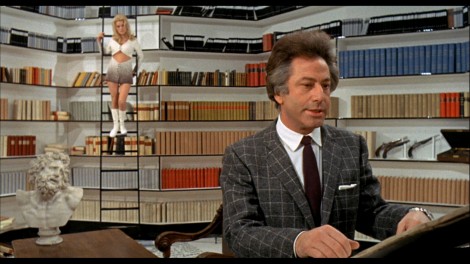
Click on the image to order THE LICKERISH QUARTET!
P: Silvana Venturelli appeared in both LICKERISH and CAMILLE – how did you find her? It looks as though she only made a few films and then disappeared.
R: Indeed she’s disappeared. I’ve tried to find her. Last I’d heard she was living in England, but she has not surfaced. The casting director in Rome got her for CAMILLE and the following year, I contacted her [about LICKERISH] and she had lost about 25 or 30 pounds between the two films, but she was eager to do it. I was very sorry that she had disappeared. She was very good. She came to New York, actually, when the film opened, and was extremely gracious. I just assumed she’d married.
P: Just retired from the business to lead a quiet life somewhere.
R: Yes, a happy one, I hope.
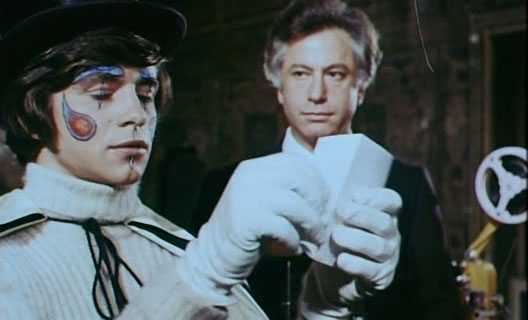
P: Was there ever worry when you were shooting films that they might become camp? With the dialogue as crisp and deliberate as it is in your films, it’s admirable that the performances are so sincere and never seem over the top.
R: I don’t have any of that in my memory. If something is clearly written, I always thought that was one of the strong allies that I had, namely it was very clear what we were doing. I don’t remember actors overplaying that much. I think the tone of the dialogue tended to be the real boss on the set. We all tended to bring forth what was written.
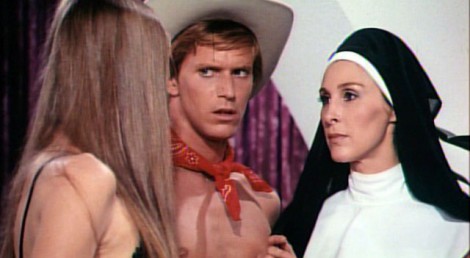
Click on the image to order SCORE!
P: Moving on to SCORE, which is honestly, my favorite of your films. It’s based on Jerry Douglas’s off-Broadway play – how did Douglas feel about his source material becoming more explicitly sexual in the film?
R: It proved to me the old line of “if it’s on the page, it’s on the stage,” because one of the things that attracted me to SCORE was that it was so clear. I’ve always felt that a lot of the compliments that I’ve gotten on SCORE I should share with Jerry Douglas, because I always felt he did a masterful job in the clarity of what he was doing. I think one of the things he accomplished that I felt was one of my challenges was that the idea that seduction is not gender-based. It’s kind of universal. And it was so clearly written that it became a much easier task for the actors and myself.
I got the actors through him. The leading lady, Claire Wilbur, was from the play. She had done the show. And I’d wanted to get one or two others from the play but they were not available. Jerry Douglas knew Cal Culver as well. I have to say I was blessed – I did a very good turn somewhere in life, because God gave me Lynn Lowry, without whom I don’t think it would have worked. They had a theatrical showing in Los Angeles and she and I both appeared, and I was very lucky to be able to say to the audience how much I owed her. If the film worked, it worked in a large part because of her.
P: Definitely. I was rewatching it, and there was a line she had that, out of the mouth of anyone else, it would have come off as a mean-spirited insult, but from her, it just comes off as beautifully naïve. She’s just this young girl that has a very innocent perspective on the world.
R: Yes, I think a lot of lines you can say that about.
P: Tell me a little more about working with Cal Culver. He’d just come off of BOYS IN THE SAND, a breakthrough hardcore gay film. Was he an initiator of shooting the hardcore component of SCORE?
R: No, I don’t think he initiated it. They knew each other [Culver and co-star Gerald Grant] and they would have just done anything they’d felt was appropriate for the movie. He was an absolute delight, a consummate professional. He took the shooting very seriously. They all did. We enjoyed the dinners together, but it was always early to bed and no partying. We were all very committed.
He had an enormous rolodex and every night, after dinner, he’d be writing postcards to everyone he knew. He was very proud of the film, and a very charming guy. I was very sorry he had a very early demise. They both did. [Culver died from an illness related to AIDS at 42 in 1987, Grant at 52 in 1993.]
P: You used him again in THE OPENING OF MISTY BEETHOVEN in a comic scene as a flamboyantly gay man whom Misty seduces. Did he enjoy playing into that stereotype?
R: Yes, he thought it was funny. I worked again with Carl Parker the following year in THE IMAGE as well.
P: Parker is so good in the smaller role in SCORE, but did you think about what the film would have been like had you cast Sylvester Stallone, who’d done the play?
R: I was kind of steered away from him. The director didn’t think he would have been right for the movie, and certainly, the way he played SCORE on the stage was a version of Rocky, which wouldn’t have blended quite the way we did the movie. Just for publicity purposes, I used to say that one of the biggest mistakes I’d made was not using Stallone in the movie, but I’m not sure that was true, because he had a sexy movie come out about the same time [PARTY AT KITTY AND STUD’S] and it didn’t do much.
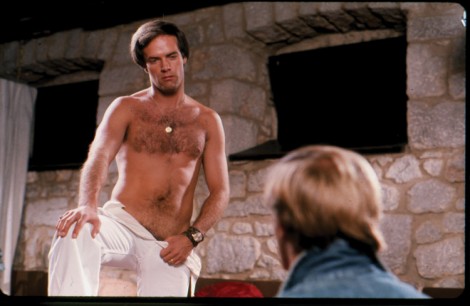
P: On the commentary for SCORE, you mention that you felt the film wasn’t financially well received not because of the gay content, but because other films at the time had included more hardcore footage. Do you still feel that’s the case?
R: I think the world was equalized. Sometimes you get very lucky, like with Lynn Lowry, and sometimes you get very unlucky with the timing. We used very light in Yugoslavia and we had the second-best cameraman in all of Yugoslavia, and I had the best sound mixer in New York, and it all came together, but down the street, DEEP THROAT had opened, and the novelty of explicit sex was such that nobody cared about the photography or the sound mixing. You could make a movie over a weekend in somebody’s basement in New Jersey, and people would flock to see it.
It’s the novelty. You go back to the concept of KING KONG, and if you give the public something they’ve never seen before, they’ll flock to it. Of course, over the years, the novelty of explicit sex has kind of worn off and people are returning again to the kind of thing we did with SCORE.
P: I love that the characters in many of your films are awash in this decadence, and yet we really have very little idea as to what they do or how they can afford to live how they do. Was this a conscious decision to leave that out of the picture and have these characters in these decadent, wealthy situations in exotic locations?
R: There’s a twofold answer to that. First, I was taught as a student that if you’re dealing with comedy or anything light, you cannot give the audience the distraction of wondering how these people make a living, or if their living is ever in jeopardy, because it takes the fun away from the lightness of it. The other part is the source material that I chose tended not to concern itself. Although, if you look at CARMEN, BABY, these people are thieves and they make a living doing all kinds of illegal things. And in the Alexander Dumas story CAMILLE, these are very rich, decadent people, and from time to time a character would be worrying about how they were going to make a living. I think it’s just that I didn’t want the audience to be distracted by how they make a living, and the stories I chose. In SCORE, we do show the character Jack making a living by being a photographer. In LICKERISH, of course, that wasn’t very realistic to begin with.
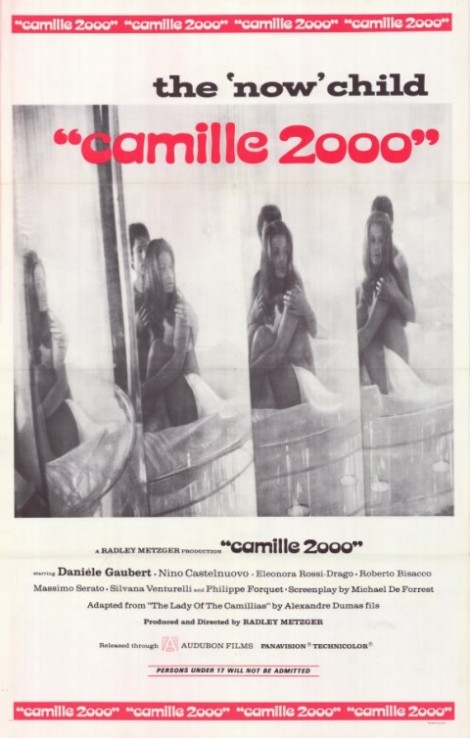
Click on the image to order CAMILLE 2000!
P: Getting back to your sources, you’ve used a number of literary sources for your films. Are there any other books that you’ve loved that you’ve been inspired by and have wanted to adapt?
R: I was very disappointed, I tried to get the rights to a Henry Miller short story, “Quiet Days in Clichy,” and I couldn’t. That was a big disappointment to me.
P: Are there plans to do remastered editions of your non-erotic films, like DARK ODYSSEY or CAT AND THE CANARY?
R: CAT AND THE CANARY we’ve held back, but I think we’re going to try to put it on the market again. I’m hoping that DARK ODYSSEY will come to the surface again and get some fresh air. I haven’t seen it – I haven’t seen any of my films. I don’t watch them again. I wish I had a good answer for why, I just don’t.
P: You distributed most of your own films through your own distribution company. Were you offered the chance to make films for other producers?
R: No, that never interested me for some reason. I think filmmakers to begin with are control freaks, and certainly film editors are, and the thought of not having complete control… though CAT AND THE CANARY was as close as I got.
P: That was distributed through someone else, correct?
R: Yes, I had a producer that was very skilled and had a huge background in horror films, Richard Gordon, who passed away last year.
P: I like CAT AND THE CANARY quite a bit – even though it’s not an “erotic” film, it’s clearly yours, and there are themes similar to your other films, even to the reading of the will via film, playing with the idea of a film within the film, as LICKERISH does. How do you keep busy now? I knew a few years ago, you produced a video series on alternative medicines – how did that come about?
R: That was very satisfying. It was prompted by the loss of my partner of 30 years [Ava Leighton]. And recently, the re-issuing of my films on Blu-ray and getting all the extras has taken an enormous amount of time. I’ll be very happy when that is done and I can concentrate – I’ve been contracted to do a script, which is very exciting. It’s a comedy.
– PAUL FREITAG-FEY
- [THE BIG QUESTION] WHAT’S YOUR FAVORITE FEMALE ENSEMBLE IN MOVIES? - July 22, 2016
- [IN THEATERS NOW] THE BOY (2016) - January 24, 2016
- Cult Movie Mania Releases Lucio Fulci Limited Edition VHS Sets - January 5, 2016

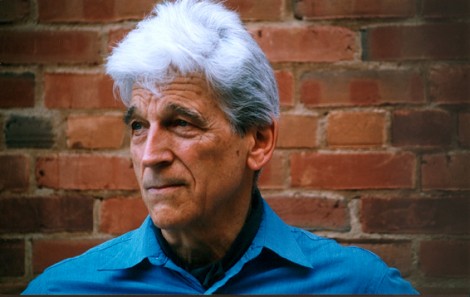




No Comments